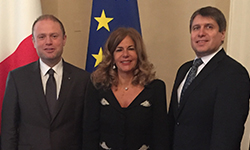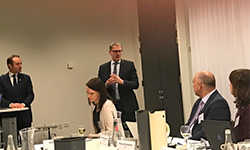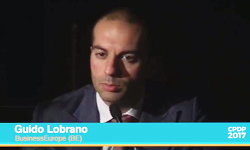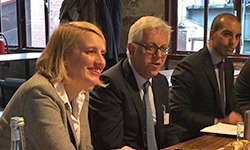BusinessEurope Headlines No. 2017-04
BusinessEurope discusses the future of Europe with the Maltese Prime Minister
 “We need more investment in Europe to fight unemployment, the first cause of inequalities, and the single market is essential to attract investors. We need more European unity, more openness to trade, and we need to streamline industrial competitiveness in all European policies. EU leaders must work together to defend the collective interest of all Europeans,” BusinessEurope President Emma Marcegaglia said during a meeting with the Maltese Prime Minister Dr Joseph Muscat. On 30 January, just a few days before the informal meeting of EU heads of state or governments on the future of Europe in Valletta, she and Director General Markus J. Beyrer, together with the Malta Chamber of Commerce - MCCEI’s President Anton Borg and DG Kevin J. Borg, met Mr Muscat. The meeting focused on BusinessEurope’s contribution to the debate on the future of Europe as well as on the priorities for the Maltese presidency.
“We need more investment in Europe to fight unemployment, the first cause of inequalities, and the single market is essential to attract investors. We need more European unity, more openness to trade, and we need to streamline industrial competitiveness in all European policies. EU leaders must work together to defend the collective interest of all Europeans,” BusinessEurope President Emma Marcegaglia said during a meeting with the Maltese Prime Minister Dr Joseph Muscat. On 30 January, just a few days before the informal meeting of EU heads of state or governments on the future of Europe in Valletta, she and Director General Markus J. Beyrer, together with the Malta Chamber of Commerce - MCCEI’s President Anton Borg and DG Kevin J. Borg, met Mr Muscat. The meeting focused on BusinessEurope’s contribution to the debate on the future of Europe as well as on the priorities for the Maltese presidency.
There are many risks that could derail the cautiously optimistic IMF forecast for 2017: rising protectionism, insufficient growth and low employment in a number of economies, geopolitical tensions, a more severe slowdown in China and, in Europe, uncertainty linked to Brexit. For BusinessEurope the European Union has to act more quickly and EU leaders have to show that the EU is delivering concrete measures that reduce uncertainty.
![]()
![]() Contact: Daniele Olivieri
Contact: Daniele Olivieri
Employment has to be the main objective of the social dimension of EMU
 “Social Europe is a reality today. In these moments of rising populism and protectionism, it is more important than ever that the EU concentrates on boosting growth and employment by encouraging labour market reforms”. This was the key message delivered by BusinessEurope Deputy Director General Thérèse de Liedekerke on 31 January at an inter-parliamentary plenary session in the European Parliament, dedicated to the social dimension of the Economic and Monetary Union (EMU). She emphasised that BusinessEurope is fully committed to continue working for a highly competitive social market economy. We need to address the real cause of European growth and employment weaknesses: a lack of competitiveness and delays in introducing necessary reforms in several member states. We must facilitate job creation by companies and hear the growing aspirations in society for a renewed conception of protection, less legalistic, with more individual empowerment to seize career opportunities.
“Social Europe is a reality today. In these moments of rising populism and protectionism, it is more important than ever that the EU concentrates on boosting growth and employment by encouraging labour market reforms”. This was the key message delivered by BusinessEurope Deputy Director General Thérèse de Liedekerke on 31 January at an inter-parliamentary plenary session in the European Parliament, dedicated to the social dimension of the Economic and Monetary Union (EMU). She emphasised that BusinessEurope is fully committed to continue working for a highly competitive social market economy. We need to address the real cause of European growth and employment weaknesses: a lack of competitiveness and delays in introducing necessary reforms in several member states. We must facilitate job creation by companies and hear the growing aspirations in society for a renewed conception of protection, less legalistic, with more individual empowerment to seize career opportunities.
Contact: Maxime Cerutti
REACH review: better implementation is needed, not a revision
 “BusinessEurope welcomes the REACH review and fully agrees with the objectives of REACH to protect health and environment, reduce animal testing, and promote innovation in the chemical value chain”, Industrial Affairs Director Alexandre Affre said. He added “REACH clearly has an added value for business and society as a whole. In our position paper, we propose several ways to make it more fit-for-purpose without having it revised.” Instead of a revision, implementation of the current regulation can be improved by strengthening guidance documents and annexes, as well as improving data gathering and selection of risk management options. Furthermore, overlaps with other EU legislation should be avoided, transparency between policymakers and stakeholders improved, and the authorization obligation should be made more cost effective.
“BusinessEurope welcomes the REACH review and fully agrees with the objectives of REACH to protect health and environment, reduce animal testing, and promote innovation in the chemical value chain”, Industrial Affairs Director Alexandre Affre said. He added “REACH clearly has an added value for business and society as a whole. In our position paper, we propose several ways to make it more fit-for-purpose without having it revised.” Instead of a revision, implementation of the current regulation can be improved by strengthening guidance documents and annexes, as well as improving data gathering and selection of risk management options. Furthermore, overlaps with other EU legislation should be avoided, transparency between policymakers and stakeholders improved, and the authorization obligation should be made more cost effective.
The 6-page position paper has been submitted to the public consultation on the REACH review and is available on the BusinessEurope website.
![]() Contact: Leon de Graaf
Contact: Leon de Graaf
International Relations Committee discusses trade challenges
 BusinessEurope International Relations committee met in Copenhagen to discuss the challenges facing trade in an international environment that is increasingly protectionist. Martin Lidegaard, member of the Danish Parliament and former Minister of Foreign Affairs, made an intervention focusing on the wave of populism and anti-trade rhetoric that is growing in the West. How business can communicate the benefits of trade better and how politicians can contribute to a more rational debate, were some of the points raised. This set the scene for the internal discussions on what European business wants from the EU trade policy, including in sensitive areas like investment protection and how business can adjust its message on trade to take into account the current political and economic environment. The debate is far from over and we will continue the discussion the 21 February in the open session of our International Relations Committee.
BusinessEurope International Relations committee met in Copenhagen to discuss the challenges facing trade in an international environment that is increasingly protectionist. Martin Lidegaard, member of the Danish Parliament and former Minister of Foreign Affairs, made an intervention focusing on the wave of populism and anti-trade rhetoric that is growing in the West. How business can communicate the benefits of trade better and how politicians can contribute to a more rational debate, were some of the points raised. This set the scene for the internal discussions on what European business wants from the EU trade policy, including in sensitive areas like investment protection and how business can adjust its message on trade to take into account the current political and economic environment. The debate is far from over and we will continue the discussion the 21 February in the open session of our International Relations Committee.
Contact: Luisa Santos
Enabling data-driven innovation will foster digitalisation
 “The basis for enabling data-driven innovation is the free movement of data, coherent rules and legal certainty for businesses”, Deputy Director Guido Lobrano said at the 26 January Computers, Privacy and Data Protection (CPDP) Conference, during the ‘Data Protection and Data Driven Innovation for Health Care and Biomedical Research’ panel. “An innovation-friendly approach and robust solutions for data use in Europe are crucial for fostering the creation of new business models and enabling global competition,” he added. Emerging issues surrounding the use of Artificial Intelligence such as data ownership, access and liability are adequately addressed by existing legislation. What we need to ensure now is the free flow of data, an increased legal certainty for businesses using data, a consistent implementation of legislation and transparency in order to gain users’ trust.
“The basis for enabling data-driven innovation is the free movement of data, coherent rules and legal certainty for businesses”, Deputy Director Guido Lobrano said at the 26 January Computers, Privacy and Data Protection (CPDP) Conference, during the ‘Data Protection and Data Driven Innovation for Health Care and Biomedical Research’ panel. “An innovation-friendly approach and robust solutions for data use in Europe are crucial for fostering the creation of new business models and enabling global competition,” he added. Emerging issues surrounding the use of Artificial Intelligence such as data ownership, access and liability are adequately addressed by existing legislation. What we need to ensure now is the free flow of data, an increased legal certainty for businesses using data, a consistent implementation of legislation and transparency in order to gain users’ trust.
Contact: Guido Lobrano
Let’s keep the detail of production statistics
 Last week, BusinessEurope presented its newly adopted position paper on PRODCOM (‘PRODuction COMmunautaire’) statistics which provide data on the production of manufactured goods. In the position paper business voices concerns about Eurostat’s intention to reduce the level of detail of the PRODCOM list, as this would imply an important loss of information for companies relying on in-depth information for strategic corporate and entrepreneurial decision-making. BusinessEurope does not believe that a reduction would significantly reduce the overall reporting burdens for companies, as many small companies are already exempt today. However, larger companies would have to adapt their reporting systems. The same concerns were raised at the most recent European Statistical Advisory Committee (ESAC) meeting, on 27 January 2017.
Last week, BusinessEurope presented its newly adopted position paper on PRODCOM (‘PRODuction COMmunautaire’) statistics which provide data on the production of manufactured goods. In the position paper business voices concerns about Eurostat’s intention to reduce the level of detail of the PRODCOM list, as this would imply an important loss of information for companies relying on in-depth information for strategic corporate and entrepreneurial decision-making. BusinessEurope does not believe that a reduction would significantly reduce the overall reporting burdens for companies, as many small companies are already exempt today. However, larger companies would have to adapt their reporting systems. The same concerns were raised at the most recent European Statistical Advisory Committee (ESAC) meeting, on 27 January 2017.
![]() Contact: Frederik Lange
Contact: Frederik Lange
Single market: lost in fragmentation
 The Economic and Monetary Union represents a major step in the integration of EU economies. Further integration of the single market is however still needed to boost Europe’s competitiveness. “Especially in services, there is great potential for further growth, thanks to the development of the digital economy and e-commerce. But we still need to overcome a lot of remaining barriers and emerging new ones, such as forced data localisation requirements”, stressed Deputy Director Guido Lobrano at the 27 January workshop, organised by the European Central Bank in Frankfurt ‘The Single Market and EMU: lost in fragmentation?’. The recent services package and the services directive implementation’s impact on innovation and competitiveness were central elements of the discussion.
The Economic and Monetary Union represents a major step in the integration of EU economies. Further integration of the single market is however still needed to boost Europe’s competitiveness. “Especially in services, there is great potential for further growth, thanks to the development of the digital economy and e-commerce. But we still need to overcome a lot of remaining barriers and emerging new ones, such as forced data localisation requirements”, stressed Deputy Director Guido Lobrano at the 27 January workshop, organised by the European Central Bank in Frankfurt ‘The Single Market and EMU: lost in fragmentation?’. The recent services package and the services directive implementation’s impact on innovation and competitiveness were central elements of the discussion.
Contact: Guido Lobrano
National federations have a key role to play in digital transformation
 On Tuesday 31 January, in the fringes of the Commission's first stakeholder forum on Digitising European Industry, BusinessEurope and the German business federation BDI held a high-level stakeholder lunch for member federations to meet and discuss existing national digitalisation initiatives. Deputy Director General of DG CNECT Khalil Rouhana joined as the guest speaker. He presented the Commission's ongoing work and stressed coordination of these initiatives, particularly for member states who are earlier in the digitisation process. Hosting the lunch, Deputy Director Guido Lobrano stressed the need for national federations to be actively involved in their member states' digitalisation initiative.
On Tuesday 31 January, in the fringes of the Commission's first stakeholder forum on Digitising European Industry, BusinessEurope and the German business federation BDI held a high-level stakeholder lunch for member federations to meet and discuss existing national digitalisation initiatives. Deputy Director General of DG CNECT Khalil Rouhana joined as the guest speaker. He presented the Commission's ongoing work and stressed coordination of these initiatives, particularly for member states who are earlier in the digitisation process. Hosting the lunch, Deputy Director Guido Lobrano stressed the need for national federations to be actively involved in their member states' digitalisation initiative.
Contact: Patrick Grant
Calendar
 3 February 2017: Informal EU27 summit, Valetta, Malta
3 February 2017: Informal EU27 summit, Valetta, Malta- 6 February 2017: Foreign Affairs Council
- 6 February 2017: China’s reform agenda: what’s next for European companies? BusinessEurope conference, Brussels
- 12 February 2017: German presidential election
- 15 February 2017: CETA plenary vote
- 21 February 2017: "Is the European single market SME-friendly? What do SMEs actually need?" BusinessEurope conference, Brussels